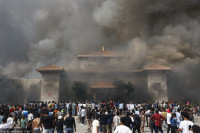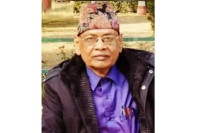Valley
Report raises doubts over effectiveness of measles vaccine
A new research has raised question on the effectiveness of measles vaccines in the country that is likely to threaten the government’s national measles elimination programme and put lives of children at risk.
Manish Gautam
A new research has raised question on the effectiveness of measles vaccines in the country that is likely to threaten the government’s national measles elimination programme and put lives of children at risk.
The Nepal Health Research Council (NHRC) in its research report disseminated on Monday shows the opposite of what other government findings claim.
NHRC findings do not support the claim that national vaccination coverage stands at 88 percent.
The report titled “Measles Outbreak in Kapilvastu, Nepal: An Outbreak Investigation, 2016” states that 67 percent of the population were non-immune, meaning they are susceptible to measles virus infection. The report also states that 21 percent of the total samples were found to be infected with measles where one third of the children came from Muslim community.
The study—conducted between February 2016 and May 2016, was prompted by the deaths of six children in Kapilvastu district where 50 children were also taken ill.
The study team surveyed 127 children less than five years of age.
Researchers said there could be various reasons associated to it. A further comprehensive probe on the matter will only give an accurate result, they said.
“Either the data that 88 percent of the children are immunised is incorrect or the health officials’ reporting is inaccurate,” said Dr Khem Karki, member-secretary of the National Health Research Council. “This also raises questions on the efficiency of vaccines that are being administered,” he said, adding that this also could mean the cold chain-maintenance might have been compromised.”
On low coverage among Muslim children, Dr Karki said there is social stigma attached to vaccination, as in certain communities, including Muslims, it is believed children should not be vaccinated.
While Nepal had maintained zero outbreak reporting of measles in 2013 and 2014, cases were reported from Somidiha-7 and 8 Somidiha of Kapilvastu.
Dr Rajendra Pant, director of the Child Health Division, said there are still three percent of the children who are never immunised. “We accept that certain ethnic communities still refrain from immunising their children and we are working with local leaders to increase the coverage. Also, increasing coverage in urban slums remains a challenge,” said Dr Pant.
Measles is a highly contagious viral disease with symptoms that includes high-fever, runny nose, bloodshot eyes among others.




 6.84°C Kathmandu
6.84°C Kathmandu












